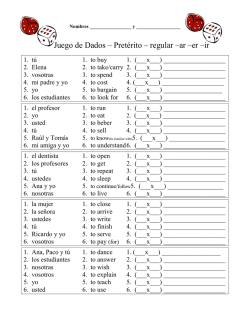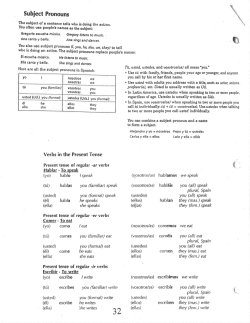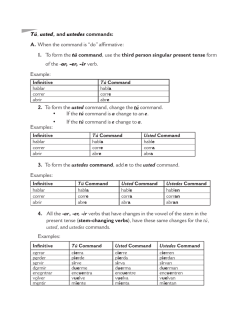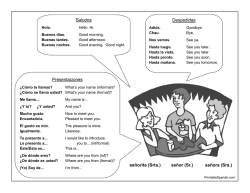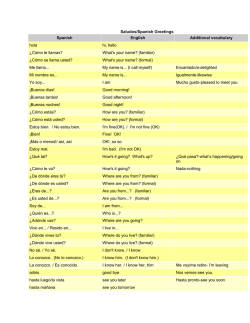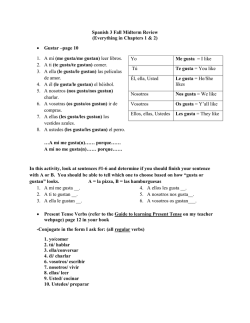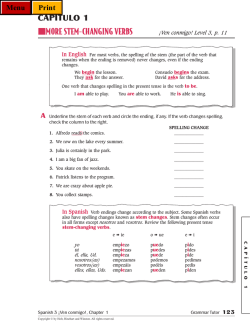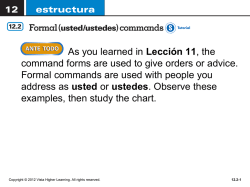
GUÍA DE ESTUDIO PARA EL EXAMEN FINAL (SEMESTRE 1) – SP 3
GUÍA DE ESTUDIO PARA EL EXAMEN FINAL (SEMESTRE 1) – SP 3 PRESENT TENSE: To conjugate a verb in the present tense, take off the –ar, -er, -ir from the end of the verb and add on the new ending. HABLAR COMER VIVIR stem-changing present tense verbs: yo hablo como vivo (o ue) poder yo puedo tú hablas comes vives (i ie) pensar yo pienso él, ella, usted habla come vive (e i) pedir yo pido nosotros/as hablamos comemos vivimos ustedes/ellos hablan comen viven -GO verbs (only in the YO form!): tener (tengo) hacer (hago) salir (salgo), poner (pongo) yo I nosotros/as we tú you (familiar) ellos/ellas they él he ustedes you all ella she usted you (formal) LOS VERBOS IRREGULARES EN EL PRESENTE LOS PRONOMBRES PERSONALES LOS VERBOS QUE CAMBIAN EN EL PRESENTE (stem-changing verbs) yo tú él, ella, usted nosotros ellos, ustedes yo tú él, ella, usted nosotros ellos, ustedes tener to have (e ie) (-go verb) tengo tienes tiene tenemos tienen decir to say (e i) (-go verb) digo dices dice decimos dicen ser - to be (who or what you are) soy eres es somos son yo tú él, ella, usted nosotros ellos, ustedes estar - to be (how or where you are) estoy estás está estamos están ir a - to go to... dar to give voy a vas a va a vamos a van a doy das da damos dan querer to want (e ie) perder to lose/miss (e ie) pensar to think (e ie) poder - to be able to/can (o ue) encontrar to find (o ue) volver to return (o ue) quiero quieres quiere queremos quieren pierdo pierdes pierde perdemos pierden puedo puedes puede podemos pueden encuentro encuentras encuentra encontramos encuentran vuelvo vuelves vuelve volvemos vuelven pedir to ask for (e i) hacer to make/do (-go verb) saber to know (head) conocer to know (heart) pido pides pide pedimos piden hago haces hace hacemos hacen pienso piensas piensa pensamos piensan salir to go out/leave (-go verb) salgo sales sale salimos salen sé sabes sabe sabemos saben conozco conoces conoce conocemos conocen LOS VERBOS REGULARES EN EL PRESENTE (regular verbs) andar – to walk caminar – to walk comprar – to buy llegar – to arrive llevar – to carry tirar – to throw tomar – to take yo ando camino compro llego llevo tiro tomo vender – to sell vendo tú él, ella, usted nosotros ellos, ustedes andas anda andamos andan caminas camina caminamos caminan compras compra compramos compran llegas llega llegamos llegan llevas lleva llevamos llevan tiras tira tiramos tiran tomas toma tomamos toman vendes vende vendemos venden LOS VERBOS REGULARES EN EL PRESENTE LOS VERBOS abrir – decidir – to to open decide yo yo abro decido tú tú abres decides él, ella, usted él, ella, usted abre decide nosotros ellos, ustedes abrimos abren decidimos deciden nosotros ellos, ustedes REFLEXIVOS (reflexive verbs) irse – to leave ponerse – to become encontrarse con… – to run into (someone) me voy te vas se va me pongo te pones se pone me encuentro con… te encuentras con… se encuentra con… nos vamos nos ponemos se van se ponen nos encontramos con… se encuentran con… LOS VERBOS REGULARES EN EL PASADO THE PAST TENSES: yo tú él, ella, usted nosotros ustedes/ellos PRETÉRITO AR ER/IR -é -í - aste - iste -ó - ió - amos - imos - aron - ieron IMPERFECTO AR ER/IR -aba -ía -abas -ías -aba -ía -ábamos -íamos -aban - ían EL PRETÉRITO completed actions, list of past actions without much detail, isolated/one-time actions, beginnings/endings EL IMPERFECTO past habitual actions, actions from the past that reach into the present, past actions that have no clear beginning or end, setting the stage for a story, talking about time or age in the past, replace past progressive tense REGULAR perdió – he/she/usted lost/missed tenía – he/she/usted had llegó – he/she/usted arrived podía – he/she/usted could compró – he/she/usted bought trató de – he/she/usted tried to tomó – he/she/usted took pensó – he/she/usted thought tiró– he/she/usted threw llevó – he/she/usted carried/wore abrió – he/she/usted opened vendió – he/she/usted sold volvió – he/she/usted returned salió – he/she/usted left conoció – he/she/usted met/knew (heart) EL PRESENTE PROGRESIVO: (the –ing of Spanish) yo tú él, ella, usted nosotros ustedes/ellos IRREGULAR fui a… I went to hice… I did/made le dio – He/she gave to him/her le dijo - he/she said to him/her se puso - he/she became LAS PALABRAS INTERROGATIVAS: estoy estás + verb + - ando (-ar verbs) está - iendo (-er, -ir verbs) estamos están Ejemplo: In English I am speaking In Spanish (Yo) estoy hablando WHO IS DOING WHAT TO WHOM me das – you give to me te doy– I give to you (familiar) le dan – they give to him/her/you (formal) nos da – he gives to us les damos – we give to them/you all (plural) Gustar ¿Quién? – Who? ¿Cuál?/ ¿Cuáles? – Which? ¿Qué? – What? ¿Por qué? – Why? ¿Cómo? – How? ¿Cuándo? – When? ¿Cuánto? – How many? ¿Cuántos? – How much? ¿Dónde? – Where? (Dónde está?) ¿De dónde? – From where? (¿De dónde eres?) ¿Adónde? – To where? (¿Adónde vas?) other verbs used: vas a darme – You’re going to give to me decir voy a darte - I’m going to give to you (familiar) pedir voy a darle - I’m going to give to him/her/you (formal) vender vas a darnos – you’re going to give to us voy a darles- I’m going to give to them/you all If one thing is liked, the verb gustar will always be in the same form, no matter who likes it. If more than one thing is liked, the verb gustar will always be in the same form, no matter who likes it. MÁS VOCABULARIO ¿Qué te gusta hacer en tu tiempo libre? – What is pleasing for you to do in your free time? Me gusta… It is pleasing to me nadar – to swim Me gustan… They are pleasing to me montar en bicicleta – to ride a bike Me encanta…. It is REALLY pleasing to me (I love it!!!) pasar tiempo con amigos – to spend time with friends Me encantan They are REALLY pleasing to me (I love them!!!) practicar deportes – to practice sports bailar – to dance usar la computadora – to use the computer cantar – to sing ver la tele – to watch t.v. correr – to run ni…ni... – neither… nor… dibujar – to draw pues… – well escuchar música – to listen to music también – also escribir – to write A mí también – me too A mí tampoco – me neither ir a la escuela – to go to school leer – to read tocar la guitarra – to play the guitar Altura (height) Ojos (Eyes) Pelo (Hair) Personalidad (Personality) alto/a – tall bajo/a –short medio/a – medium grande – big pequeño/a –small almendrado/a – almond claro/a – hazel/light azul – blue marrón – brown verde – green liso – straight ondulado – wavy rizado – curly rubio – blonde marrón – brown negro – black artístico/a – artistic perezoso/a – lazy atrevido/a – daring tímido/a – shy deportista – sports-minded serio/a – serious desordenado/a – messy simpático/a – nice, friendly estudioso/a – studious antipático/a – rude/unfriendly gracioso/a – funny sociable – sociable impaciente – impatient talentoso/a – talented inteligente – intelligent trabajador/ora – hardworking ordenado/a – neat paciente – patient tener miedo – to have fear … hambre – to have hunger … sueño – to have sleepiness … buena suerte – to have good luck … mala suerte – to have bad luck …vergüenza – to have embarrassment/shame se pone - he/she becomes se pone feliz - he/she becomes happy se pone triste - he/she becomes sad se pone enojado(a) - he/she becomes angry tomar un avión, un tren, un autobús, un barco – to take a plane, train, bus, boat hay/había – there is/are, there was/there were viejo – old le da un abrazo/beso – he/she gives him/her a hug/kiss aquí – here (close enough to touch) le dice - he/she says to him/her allí – over there (can see it but too far to touch) andar /caminar – to walk allá – way over there (might not even be able to see it) hacia – towards llegar temprano – to arrive early la calle – the street llegar a tiempo – to arrive on time así que - so llegar tarde – to arrive late ¡Qué barbaridad! - What an outrage! es demasiado tarde – it’s too late ¡Qué lástima! – What a shame/pity! menos – except for/minus ¡Qué alivio! – What a relief! el lugar – the place Encuentra – he/she finds el pueblo – the town Me voy – I’m leaving, bye! la ciudad – the city se encuentra con - he/she runs into (someone) el país – the country ¡Qué casualidad! – What a coincidence! el mundo – the world le gusta viajar– he/she/usted likes to travel está encima de – on top of llegar temprano – to arrive early está debajo de – underneath/below comprar un boleto/billete – to buy a ticket está al lado de – next to por eso – for that reason/that is why… está cerca de – close to una maleta– a suitcase está lejos de – far from algo mejor– something better ¡No lo puedo creer! – I can’t believe it! la vida – life ¿Cuánto cuesta(n)? – How much does it/do they cost? la mujer – the woman es caro – it’s expensive la gente – the people es barato – it’s cheap el hijo – the son mientras – meanwhile/while la hija – the daughter nadie – nobody siempre – always disculpe – excuse me (ask a question) nunca – never con permiso – excuse me (move through a crowd) joven – young perdón – excuse me (oops!!!) THIS and THESE both have T’s. esto/esta – this estos/estas – these THAT and THOSE don’t. eso/esa – that esos/esas - those CONCEPTOS 4.O NOUN/ADJECTIVE/VERB AGREEMENT: noun: a person, place, or thing adjective: describes a person, place, or thing Noun/adjective agreement: adjectives must match their nouns in Spanish. Examples: La chica es simpática. El chico es simpático. Las chicas son simpáticas. Los chicos son simpáticos. Esas chicas son simpáticas Estos chicos son simpáticos ACCENTS: There are TWO natural laws of pronunciation in Spanish: - If a word ends in –N, -S, or a VOWEL (a,e,i,o,u), the stress falls on the second to last syllable. - Examples: casa, mañana, inteligente, chicas, hablan If a word ends in anything else (R, L, Z, etc.), the stress falls on the LAST syllable. Examples: azul, feliz, ayer, encontrar, casualidad, actor *** If a word BREAKS rule number #1 or #2, it needs an ACCENT. Examples: después (breaks rule #1) lápiz (breaks rule #2) así que (breaks rule #1) fácil (breaks rule #2) inglés (breaks rule #1) árbol (breaks rule #2) perdón (breaks rule #1) lástima (breaks rule #1) ANOTHER REASON ACCENTS ARE USED: When a word can mean two different things, an accent distinguishes which is which. Examples: que – what/that ¿Qué? – What? (question) como – like/as ¿Cómo? – What/How? (question) si – if sí – yes el – the él – he esta – this está – he/she is hablo – I talk habló – he/she talked jugo – juice jugó – he/she played hacia – towards hacía – he/she used to make/do papa – potato papá – dad WHO IS DOING WHAT TO WHOM: When you have the verb “ir” (to go) and use it for “voy a…”, or querer (to want) “quiero…” , etc. and you want to mix these verbs with an indirect object pronoun, it looks like this: Voy a darle un beso I’m going to give to him/her a kiss. The “le” goes at the end of the verb in the infinitive (unconjugated verb) Quiero darle un beso I want to give to him/her a kiss. The “le” goes at the end of the verb in the infinitive (unconjugated verb) Another way to say the same thing: le/me/te, etc. can also go IN FRONT of the verb IR. ir Le voy a dar un beso. I am going to give to him/her a kiss. ir Me va a dar un beso. He is going to give to me a kiss. TWO VERBS TOGETHER: When you have two verbs next to one another, the second verb always ends in –R (the verb remains in the infinitive). Examples: Quiero ir a Hawaii. ¿Necesitas estudiar para el examen? (I want to go to Hawaii) (Do you need to study for the test?) PAST TENSE VERBS IN TENSES OTHER THAN HE/SHE/YOU FORMAL THE PAST TENSES: yo tú él, ella, usted nosotros ustedes/ellos PRETÉRITO AR ER/IR -é -í - aste - iste -ó - ió - amos - imos - aron - ieron IMPERFECTO AR ER/IR -aba -ía -abas -ías -aba -ía -ábamos -íamos -aban - ían EL PRETÉRITO completed actions, list of past actions without much detail, isolated/one-time actions, beginnings/endings EL IMPERFECTO past habitual actions, actions from the past that reach into the present, past actions that have no clear beginning or end, setting the stage for a story, talking about time or age in the past, replace past progressive tense
© Copyright 2026

